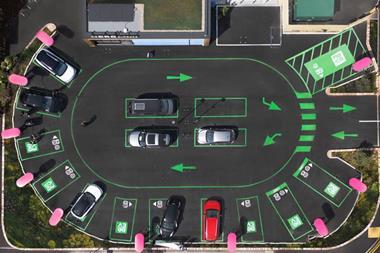
Proposals to construct a new motorway services area (MSA) on the M4 by J37 have prompted the local council to warn that the plans would increase car use, and so be in contravention of the authority’s Local Development Plan.
Draycott Investments and Developments is seeking permission to construct the services, which would comprise a filling station with four pump islands and 10 EV charging bays, together with McDonald’s, Starbucks and Greggs drive-through restaurants, with parking for 100 vehicles.
Full planning documents have been submitted to Bridgend County Council for the MSA, and included in these is the developer’s response to a 2022 Zoom meeting held with the local authority, in which the council warned that the plans were likely to encourage private car use.
This is in contravention of the Bridgend County Borough Local Development Plan (2018-2033), which stipulates that “development must be located and designed in a way that minimises the need to travel, reduces dependency on the private car and enables sustainable access”.
The developers argue that the proposed services are “specifically designed to cater for travellers or traffic movements which already exist [emphasis theirs]”, adding that “it would be mistaken to consider the facility, in itself, as a generator of traffic”.
The propsed services would be 20 miles east of Moto’s Swansea West services, but just 5.6 miles west from Welcome Break’s Sarn Park MSA at J36 of the M4, though the developers argue the interchanges for both these services are ”particularly congested at peak periods”.
The council also raised concerns that the development would entice local residents to make special trips to visit the motorway services. The developers rejected this argument, citing that they project 98% of McDonald’s customers would be passing travellers, and that the MSA is not “a destination in its own right”, but will serve those “who are already travelling”.
Consideration is also given to the phasing out of petrol and diesel cars, with the documents setting out as well as EV chargers featuring at the filling station, there will continue to be demand for oil-derived fuels for “a further 15 years” after all new cars must be electric, which currently policy mandates will occur in 2035. The developers add that “provision for hydrogen tanks to replace diesel in the medium to long term is also feasible” at the forecourt.
This is not the first time authorities have voiced reluctance to grant planning permission for a development over concerns it could encourage car use. Renfrewshire Council in Scotland recently refused permission for a new PFS partly on the grounds it would “increase dependency on car travel” and therefore go against national planning strategy, which seeks, among other things, to bring about “a 20% reduction in car kilometres by 2030”.




























